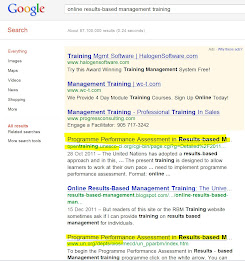--Greg Armstrong --
The UN’s Programme Performance Assessment in Results-Based Management, is a jargon-laden, time-consuming and partially out of date production that, whatever its original merits, is too frustrating to be useful today. There are more productive ways to spend your time.
Level of Difficulty: Moderate to Complex
Primarily Useful As: Difficult to say - a history of UN RBM jargon?
Most useful: Section 4-5 on data collection and reporting
Limitations: Out-of-date RBM language,jargon-laden, boring format
Background:
Online RBM training is unlikely to provide the hands-on practice and the opportunities for learning of group processes which are the foundation for effective Results-Based Management training and implementation, but some courses are definitely better than others.
After my December 15, 2011 post describing the University of Wisconsin’s effective interactive online results-based management course, I was asked by one reader for my opinion of other online RBM courses. The University of Wisconsin’s Logic Model course, is, in my opinion, excellent, making the most of interactive opportunities available in the absence of live training.
On the other end of the spectrum, however, is an online course available from the UN Office of Internal Oversight Services–Programme Performance Programme Performance Assessment in Results-based Management.
If we do a plain word search for "online results based management course" (without the quotes) on Google's .com search we will get, depending on the day, more than 80 million hits, and on page one of this search – at least as of January 31, 2012, the first and third results shown are for this specific UN RBM course.
Those search results may vary slightly given country-specific versions of the search engines, but Microsoft's Bing and Yahoo search return several million results on this topic too, again with this UN RBM course ranking very high in the search results.
The highest ranked result --with a 2011 date-- is UNESCO’s Open Training Portal, and if we click on the UNESCO link, it takes us to what appears to be the home of the course, the UN’s Office of Internal Oversight Services, which is number 3 on the search list. The course also appears as a link in some other UN documents.
So - how does this highly-ranked course stand up to scrutiny?
The UN’s Programme Performance Assessment in Results-Based Management, is a jargon-laden, time-consuming and partially out of date production that, whatever its original merits, is too frustrating to be useful today. There are more productive ways to spend your time.
Level of Difficulty: Moderate to Complex
Primarily Useful As: Difficult to say - a history of UN RBM jargon?
Most useful: Section 4-5 on data collection and reporting
Limitations: Out-of-date RBM language,jargon-laden, boring format
Background:
Online RBM training is unlikely to provide the hands-on practice and the opportunities for learning of group processes which are the foundation for effective Results-Based Management training and implementation, but some courses are definitely better than others.
After my December 15, 2011 post describing the University of Wisconsin’s effective interactive online results-based management course, I was asked by one reader for my opinion of other online RBM courses. The University of Wisconsin’s Logic Model course, is, in my opinion, excellent, making the most of interactive opportunities available in the absence of live training.
 |
| Google search results - Online Results-Based Management Training CLICK image to enlarge |
If we do a plain word search for "online results based management course" (without the quotes) on Google's .com search we will get, depending on the day, more than 80 million hits, and on page one of this search – at least as of January 31, 2012, the first and third results shown are for this specific UN RBM course.
Those search results may vary slightly given country-specific versions of the search engines, but Microsoft's Bing and Yahoo search return several million results on this topic too, again with this UN RBM course ranking very high in the search results.
The highest ranked result --with a 2011 date-- is UNESCO’s Open Training Portal, and if we click on the UNESCO link, it takes us to what appears to be the home of the course, the UN’s Office of Internal Oversight Services, which is number 3 on the search list. The course also appears as a link in some other UN documents.
So - how does this highly-ranked course stand up to scrutiny?






